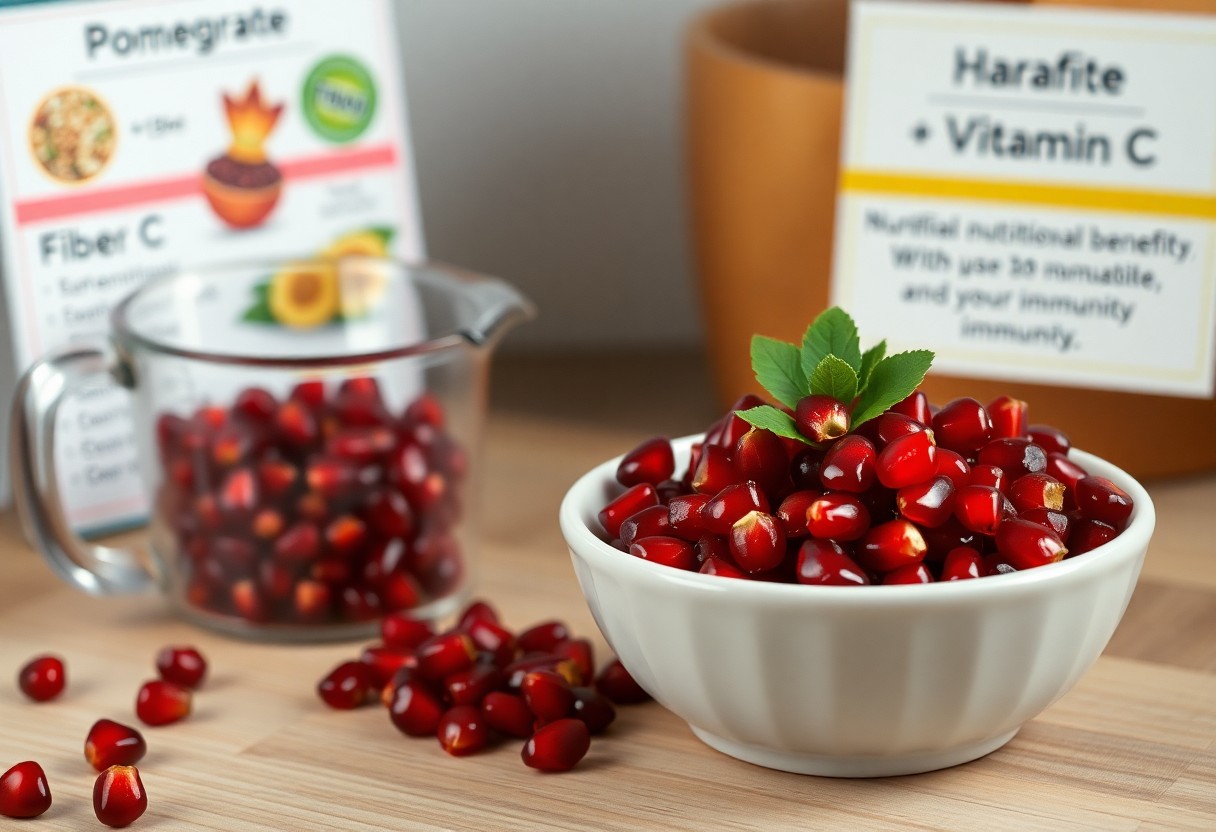Just by incorporating pomegranates into your diet, you can support your immune system while enjoying a delicious fruit. Packed with vitamins, antioxidants, and anti-inflammatory properties, pomegranates contribute to overall health and well-being. This informative post will explore the nutrition facts of this superfood and highlight its numerous health benefits, empowering you to make informed choices for a stronger immune defense.

Nutritional Profile of Pomegranate
To grasp the health advantages of pomegranates, it’s important to understand their rich nutritional profile. These vibrant fruits are low in calories yet packed with vital nutrients, including dietary fiber, vitamins, and minerals that support overall wellness. One small to medium pomegranate contains an array of nutrients that contribute to immune health and more.
Vitamins and Minerals
On a nutritional level, pomegranates are a fantastic source of vitamins such as vitamin C, K, and folate, along with minerals like potassium and magnesium. These vitamins and minerals play key roles in enhancing your immune system, promoting healthy blood pressure, and reducing inflammation.
Antioxidants and Phytochemicals
Nutritional powerhouse pomegranates are rich in antioxidants and phytochemicals, primarily punicalagins and anthocyanins, which are known for their health-promoting properties. These compounds help neutralize free radicals in your body, protecting cells from oxidative stress and contributing to a reduced risk of chronic diseases.
Understanding the significance of these antioxidants and phytochemicals is vital for your health. They not only bolster your immune system but also aid in reducing inflammation and improving overall cardiovascular health. By consuming pomegranates, you can harness these benefits, helping to support your body in fighting off illness and maintaining optimal wellness.
Immune System Support
Some of the most powerful nutrients found in pomegranates enhance your immune system, helping your body fend off infections and illnesses. Rich in vitamins C and E, along with diverse phytochemicals, these fruits support immune cell function and inflammation reduction. Incorporating pomegranates into your diet can provide a natural boost to your immunity, ensuring you stay healthier year-round.
Role of Antioxidants in Immunity
Across various studies, antioxidants have been shown to play a pivotal role in enhancing immune response. They help neutralize free radicals, reducing oxidative stress in your body, which can weaken your immune system. By consuming antioxidant-rich foods like pomegranates, you increase your body's resilience against pathogens and bolster your overall health.
Pomegranate's Impact on Immune Function
Against various pathogens, pomegranates have demonstrated a positive influence on your immune function. The polyphenolic compounds in pomegranates, particularly punicalagins and anthocyanins, exhibit antimicrobial and anti-inflammatory properties. Regular consumption may lead to improved immunity, as these compounds stimulate the production of immune cells while suppressing harmful pathogens.
For instance, research indicates that pomegranate extracts can enhance the activity of immune cells, such as macrophages and T-cells, which are necessary for defending your body against infections. This can lead to a strengthened immune system that is more effective at combating illnesses and maintaining overall health. Including pomegranates in your diet can thus be a strategic step toward better immune support and long-term wellness.
Anti-Inflammatory Properties
You can benefit from the remarkable anti-inflammatory properties of pomegranates, which contain powerful antioxidants that help reduce inflammation in your body. These antioxidants, particularly punicalagins and anthocyanins, act by neutralizing free radicals and modulating inflammatory pathways, thus supporting a healthier immune response. Regular inclusion of pomegranates in your diet may help you maintain optimal health and combat inflammation-related diseases.
Reducing Chronic Inflammation
Beside their antioxidant benefits, pomegranates have shown promise in reducing chronic inflammation markers in your body. Studies indicate that the compounds found in pomegranates may inhibit inflammatory enzymes, leading to decreased levels of C-reactive protein and other inflammatory markers. This can be particularly beneficial for managing conditions related to chronic inflammation, allowing you to support your overall health effectively.
Effect on Inflammatory Diseases
The intake of pomegranates may positively impact various inflammatory diseases, such as arthritis and cardiovascular issues. By reducing inflammation, these fruits can help alleviate symptoms and improve your quality of life.
Anti-inflammatory properties of pomegranates may lead to better management of inflammatory diseases. Research indicates that regular consumption can result in decreased joint pain and swelling in arthritis sufferers. Additionally, the cardiovascular benefits, linked to reduced arterial inflammation, can help lower your risk of heart disease. Incorporating pomegranates into your diet not only enhances your meals but also supports your health by targeting inflammation at its source.
Cardiovascular Health Benefits
Now, incorporating pomegranates into your diet can significantly enhance your cardiovascular health. Packed with antioxidants, pomegranates help reduce oxidative stress and inflammation, promoting healthy blood flow. Regular consumption may lower your cholesterol levels and improve overall heart function, supporting a healthy heart and circulatory system.
Heart Health and Pomegranate
Health benefits of pomegranate for your heart include improved arterial function and reduced risk of atherosclerosis. The nutrients in pomegranates can support heart health by fighting inflammation and enhancing blood circulation, which are key factors in maintaining a strong cardiovascular system.
Blood Pressure Regulation
About 30% of adults experience high blood pressure, which can pose serious health risks. Pomegranates have been shown to help lower blood pressure levels due to their high antioxidant content and ability to improve endothelial function. This can be beneficial for your overall health and well-being.
Benefits of adding pomegranates to your diet include improved blood pressure regulation, which can enhance heart health and decrease the risk of cardiovascular diseases. The natural compounds in pomegranates help dilate blood vessels and optimize blood flow, making them an excellent choice for your daily nutrition.
Potential Anti-Cancer Properties
Not only do pomegranates offer a wealth of nutrients, but studies suggest that they may also possess anti-cancer properties. Rich in antioxidants, particularly punicalagins and punicic acid, pomegranates may inhibit tumor growth and promote apoptosis in certain cancer cells, making them a valuable addition to your diet for overall health.
Research on Cancer Prevention
Between various studies, a consistent pattern emerges indicating that pomegranate extract can reduce cancer cell proliferation and induce cell death. Significant evidence highlights its potential in combating breast, prostate, and colon cancers, suggesting that integrating this fruit into your diet may enhance your body's natural defenses against these diseases.
Mechanisms of Action
Against cancer, pomegranates work through multiple mechanisms, including the modulation of cell signaling pathways that regulate cell growth and apoptosis. Their bioactive compounds may hinder the inflammatory processes that contribute to cancer progression.
Further exploring the mechanisms of action, pomegranates exhibit anti-inflammatory effects by inhibiting the production of pro-inflammatory mediators, which can be linked to cancer development. Additionally, their antioxidants scavenge free radicals, reducing oxidative stress that may lead to DNA damage. This multifaceted approach positions pomegranates as a formidable ally in cancer prevention strategies, helping you maintain better health.

How to Incorporate Pomegranate into Your Diet
Many ways exist to enjoy pomegranate, making it easy to add to your daily meals. You can eat the seeds raw, sprinkle them on salads, blend them into smoothies, or use pomegranate juice in marinades. Try adding the seeds to yogurt or oatmeal for a nutritious burst of flavor. Consuming pomegranate regularly can be a delicious and healthful addition to your diet.
Consumption Methods
Diet is a flexible aspect when it comes to including pomegranate. You can enjoy the whole fruit, drink its juice, or sprinkle the seeds over various dishes. Each method offers unique benefits while providing imperative nutrients that support your immune system.
Recipe Ideas
With your creativity, pomegranate can enhance numerous recipes. Try adding pomegranate seeds to grain bowls, salads, or even savory dishes like roasted vegetables and meat. You can also make refreshing pomegranate salsa or a vibrant glaze for fish or chicken.
Further, experiment with different cuisines by integrating pomegranate in Middle Eastern dishes such as tabbouleh or Persian rice. You might also enjoy pomegranate in desserts like parfaits or drizzle it over ice cream for an exotic twist. Utilizing pomegranate in your meals can bring variety and nutritious benefits to your diet.
To wrap up
Taking this into account, incorporating pomegranates into your diet can significantly enhance your immune system due to their rich array of vitamins, minerals, and antioxidants. By consuming this nutrient-dense fruit, you can boost your body's defenses against illnesses and promote overall health. Make pomegranates a regular part of your meals to take advantage of their numerous health benefits and support your well-being.
FAQ
Q: What are the key nutrients found in pomegranates?
A: Pomegranates are rich in vitamin C, vitamin K, potassium, and dietary fiber. They also contain antioxidants such as punicalagins and anthocyanins, which contribute to their health benefits.
Q: How do pomegranates support the immune system?
A: Pomegranates contain antioxidants that help reduce inflammation and strengthen the body's immune response. The high vitamin C content also plays a significant role in improving overall immunity.
Q: Can consuming pomegranates prevent illnesses?
A: While pomegranates can enhance immune function, they are not a guaranteed method of illness prevention. A balanced diet and healthy lifestyle are important for overall health.
Q: What is the recommended serving size of pomegranate for health benefits?
A: A typical serving size is about half a pomegranate or 1 cup of arils (seeds). This amount provides a good dose of nutrients and antioxidants beneficial for health.
Q: Are there any potential side effects of consuming pomegranates?
A: Pomegranates are generally safe for most people. However, excessive consumption may lead to digestive issues or interactions with medications, particularly those affecting blood pressure.

0 Comments